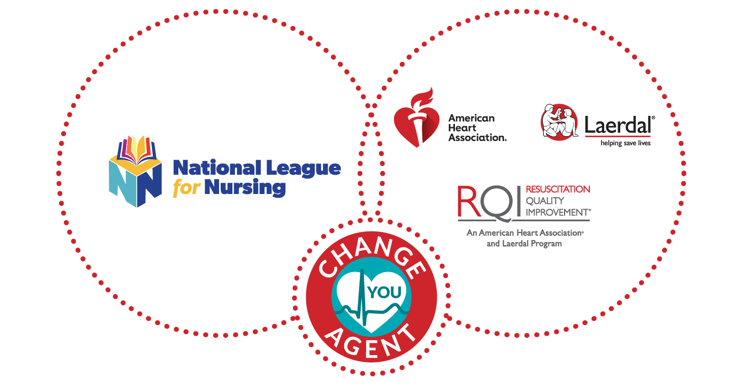Research
Research by M.H Oermann, Ph.D., Ph.D., RN, ANEF, FAAN- Thelma M.Ingles Professor of Nursing at Duke University School of Nursing: low-dose high frequency to achieve competency
Research by M.H Oermann, Ph.D., Ph.D., RN, ANEF, FAAN- Thelma M.Ingles Professor of Nursing at Duke University School of Nursing: low-dose high frequency to achieve competency
Resuscitation Quality Improvement Evidence for Colleges
I. RQI-Based: Nursing Students
Undergraduate nursing students’ acquisition and retention of CPR knowledge and skills
Madden. Nurse Education Today. 2005
- Undergraduate nursing students demonstrated a significant decay of both CPR knowledge and skill 10 weeks following CPR training.
- When assessed on CPR cognitive knowledge via an exam, only 6% of learners could pass post 1-year of a CPR training course. 72% were able to immediately pass a post-test of CPR training and only 44% were able to pass a re-test 10 weeks post CPR training.
- None of the nursing students were able to demonstrate a passing score of CPR skills post 1-year of CPR training. Learners showed significant improvement in CPR scores immediately post a CPR training but showed a significant decrease in CPR skills 10 weeks following CPR training.
- The study supports existing research on the need for CPR skill acquisition and maintenance of competency over time with increased frequency of training.
Resuscitation Quality Improvement Evidence for Colleges
I. RQI-Based: Nursing Students
Undergraduate nursing students’ acquisition and retention of CPR knowledge and skills
Madden. Nurse Education Today. 2005
- Undergraduate nursing students demonstrated a significant decay of both CPR knowledge and skill 10 weeks following CPR training.
- When assessed on CPR cognitive knowledge via an exam, only 6% of learners could pass post 1-year of a CPR training course. 72% were able to immediately pass a post-test of CPR training and only 44% were able to pass a re-test 10 weeks post CPR training.
- None of the nursing students were able to demonstrate a passing score of CPR skills post 1-year of CPR training. Learners showed significant improvement in CPR scores immediately post a CPR training but showed a significant decrease in CPR skills 10 weeks following CPR training.
- The study supports existing research on the need for CPR skill acquisition and maintenance of competency over time with increased frequency of training.
Research Articles
Research Articles
-
Effects of monthly practice on nursing students’ CPR psychomotor skill performance
November 18, 2010
Marilyn H. Oermanna
Suzan E. Kardong-Edgren
Tamara Odom-Maryon
The study examined the effects of brief monthly practice on nursing students’ CPR psychomotor skill performance at 3, 6, 9, and 12 months compared to a control group with no practice, and of repeating the initial BLS course at 12 months.
-
Baseline Cardiopulmonary Resuscitation Skill Performance of Nursing Students Is Improved After One Resuscitation Quality Improvement Skill Refresher
March/April 2020
Suzan Kardong-Edgren, PhD, RN, ANEF, CHSE, FSSH, FAAN
Marilyn H. Oermann, PhD, RN, ANEF, FAAN
Tiffany S. Jastrzembski, PhD
Michael A. Krusmark, MA
Kevin A. Gluck, PhD
Margory A. Molloy, DNP, RN, CNE, CHSE
Carrie Westmoreland Miller, PhD, RN, CNE, CHSE, IBCLC
Suzanne Webb, MSN, RN, CHSE
Erica Frost, MSN, RN, CNE, CCRN-K
Janice A. Sarasnick, PhD, RN, CHSE-A
This article reports the results of baseline cardiopulmonary resuscitation (CPR) skills performance measurements from 467 nursing students. All participants had completed a CPR course. Baseline measurements were compared to performance after one 10-minute refresher training session on the Resuscitation Quality Improvement system.
-
Personalized Training Schedules for Retention and Sustainment of Cardiopulmonary Resuscitation Skills
Marilyn H. Oermann, PhD, RN, ANEF, FAAN
Michael A. Krusmark, MA
Suzan Kardong-Edgren, PhD, RN, ANEF, CHSE, FSSH, FAAN
Tiffany S. Jastrzembski, PhD
Kevin A. Gluck, PhD
The study examined how the spacing of training during initial acquisition of cardiopulmonary resuscitation (CPR) skill affects longer-term retention and sustainment of these skills.
-
Effects of monthly practice on nursing students’ CPR psychomotor skill performance
November 18, 2010
Marilyn H. Oermanna
Suzan E. Kardong-Edgren
Tamara Odom-Maryon
The study examined the effects of brief monthly practice on nursing students’ CPR psychomotor skill performance at 3, 6, 9, and 12 months compared to a control group with no practice, and of repeating the initial BLS course at 12 months.
-
Baseline Cardiopulmonary Resuscitation Skill Performance of Nursing Students Is Improved After One Resuscitation Quality Improvement Skill Refresher
March/April 2020
Suzan Kardong-Edgren, PhD, RN, ANEF, CHSE, FSSH, FAAN
Marilyn H. Oermann, PhD, RN, ANEF, FAAN
Tiffany S. Jastrzembski, PhD
Michael A. Krusmark, MA
Kevin A. Gluck, PhD
Margory A. Molloy, DNP, RN, CNE, CHSE
Carrie Westmoreland Miller, PhD, RN, CNE, CHSE, IBCLC
Suzanne Webb, MSN, RN, CHSE
Erica Frost, MSN, RN, CNE, CCRN-K
Janice A. Sarasnick, PhD, RN, CHSE-A
This article reports the results of baseline cardiopulmonary resuscitation (CPR) skills performance measurements from 467 nursing students. All participants had completed a CPR course. Baseline measurements were compared to performance after one 10-minute refresher training session on the Resuscitation Quality Improvement system.
-
Personalized Training Schedules for Retention and Sustainment of Cardiopulmonary Resuscitation Skills
Marilyn H. Oermann, PhD, RN, ANEF, FAAN
Michael A. Krusmark, MA
Suzan Kardong-Edgren, PhD, RN, ANEF, CHSE, FSSH, FAAN
Tiffany S. Jastrzembski, PhD
Kevin A. Gluck, PhD
The study examined how the spacing of training during initial acquisition of cardiopulmonary resuscitation (CPR) skill affects longer-term retention and sustainment of these skills.


